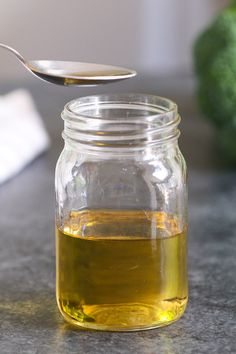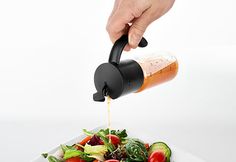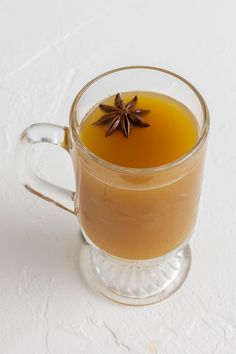The Top 15 Alternatives for Mirin

Mirin is a sweet umami-flavored Japanese rice wine used in sauces, dressings, broths, marinades, and glazes. It’s a product created from distilled rice liquor, steamed glutinous rice, and cultured rice that’s been fermented.
Throughout two months to many years, this combination is allowed to ferment. Mirin will have a stronger taste and a deeper color if fermented for a longer period.
Mirin comes in three different varieties. True mirin contains 14 percent alcohol; salt mirin, which contains at least 1,5 percent salt; and new mirin, which has less than 1% alcohol.
Mirin has a high sugar content but is low in alcohol. Mirin does not include any added sugars because the sugar is produced organically during the fermentation process.
If you want to make a dish that asks for mirin but can’t locate it in the shop, you can replace some other goods.
Mirin can be replaced with sake, rice vinegar, sherry, balsamic vinegar, Authentic Chinese wine, vermouth, white wine, marsala wine, and white grape juice.
There are a few more mirin alternatives in the following list, so keep reading to discover one that suits your dish.
Alternatives for Mirin
When substituting a component for mirin, sweet, acidic qualities are required to provide a flavor comparable to mirin.
If you don’t want to utilize the ones that include alcohol, there are nonalcoholic alternatives. Which one you pick is said by your meal’s taste profile you wish to achieve.
1. Sake

Sake is fermented rice, water, and koji mold-based alcoholic beverage. It has a greater alcohol concentration (15-16%) than mirin and is less sweet.
Sake tenderizes meat and fish by removing unpleasant odors and tastes in sauces, stocks, soups, and marinades.
It’s used early in the recipe to cut down on the alcohol and give the dish a beautiful umami taste. You may replace mirin with sake in a 1:1 ratio in your recipes.
2. Rice Vinegar
Rice vinegar is manufactured from fermented rice, just as mirin. It has a sourer, more acidic flavor than mirin, though. Rice vinegar comes in white, red, and black types, each distinct flavor.
Many sauces, marinades, salad dressings, stir-fries, pickled vegetables, and other dishes benefit from it. Rice vinegar is alcohol-free and has a mild, somewhat sweet acidic taste.
Substitute 12 teaspoons of sugar for one tablespoon of vinegar and the combination for the same quantity of mirin. To create a flavor comparable to mirin, you can add some sugar.
3. Dry Sherry
Dry sherry is a fortified wine that comes in various styles and tastes.
Sherry comes in both dry and sweet varieties, with nutty, saline, and dry fruit notes. The alcohol content of dry sherry is typically 15-17 percent. It is incorporated to intensify the flavor of both sweet and savory meals.
It has a light, delicate flavor that isn’t too sweet. If you feel like using it as a mirin alternative, you may sweeten it with sugar or another sweetener to create a close flavor.
In sauces, glazes, and marinades, replace one tablespoon of mirin with 12 teaspoon sugar and one tablespoon dry sherry.
4. Balsamic Vinegar

Balsamic vinegar is a viscous liquid derived from unfermented grape juice with a dark brown tint. Salad dressings, marinades, grilled vegetables and meat, sauces, risotto, pasta, and desserts benefit from its sweet and acidic flavor.
It may be substituted for mirin in various sauces, salads, soups, stews, marinades, and other dishes. In your preparation, you may replace one tablespoon of mirin with two tablespoons of balsamic vinegar.
5. Chinese Cooking Wine
Rice fermented and distilled is used to make Chinese cooking wine. It’s used in a variety of Asian recipes. Although not as sweet as mirin, Chinese cooking wine has a fragrant and somewhat sweet nutty-caramel taste.
It’s used in marinades, soups, stocks, sauces, stir-fries, and other dishes. As an alternative for mirin, you can use Chinese cooking wine both with and without additional sugar, depending on your preference.
However, this wine has a higher alcohol content (18-25%) than mirin. One tablespoon mirin can be replaced with one tablespoon Chinese cooking wine and half a teaspoon of sugar.
6. Vermouth
Vermouth comes in various tastes and is seasoned with multiple herbs and spices. This fortified wine prepared from various wine grapes is used as an aperitif and in cocktails such as the Manhattan and Martini.
Vermouth can also be used instead of the white vine in cooking. Vermouth comes in two flavors: sweet and dry.
Sweet vermouth, which has 10-15% sugar, is a superior alternative for mirin than dry vermouth, with around 4% sugar.
Vermouth can be used in place of mirin in sauces, spice mixes, and marinades. 12 cup mirin can be replaced with two teaspoons sugar and 12 cups vermouth.
7. White Wine
Mirin can easily be replaced with white wine. To get a flavor comparable to mirin, use dry white wine and a little sugar.
Depending on the grape variety, the winemaking technique, and the location where the grape is cultivated, dry wines might have nutty, flowery, or citrus characteristics. Because they are acidic rather than sweet, you must add sugar to achieve a flavor comparable to mirin.
Stocks, soups, marinades, dips, glazes, and sauces may all benefit from a splash of dry white wine. One tablespoon mirin is replaced with white wine and 12 tablespoons of sugar.
8. Marsala Wine
Marsala wine may be quite sweet, with notes of dried fruit and nutty and brown sugar flavors. It’s a fortified wine made in Sicily that may be used in baking and cooking.
This wine is divided into three varieties depending upon the level of sweetness. Secco has 40 grams of sugar per liter, semi seco contains 50 to 100 grams of sugar per liter, and dolce contains more than 100 grams per liter.
Marsala wine is both sweet and sour. In sauces, glazes, dipping sauces, marinades, and other foods, one tablespoon marsala wine can be substituted for one tablespoon mirin.
9. White Grape Juice

Mirin can be replaced with white grape juice, a nonalcoholic alternative. It has a sweet flavor and is prepared from the juice of crushed and mixed grapes.
This juice is high in vitamins and minerals that are beneficial to your health. You don’t need to add any additional sugar because it’s inherently sweet.
If you want a flavor comparable to mirin, combine one tablespoon lemon juice with 1 cup white grape juice and use it as an alternative.
Use two tablespoons of white grape juice in place of one tablespoon of mirin in sauces, cooked vegetables, stews, and other recipes.
10. Sake and Sugar or Honey
As previously stated, sake can be used as a replacement for mirin. Because it is less sweet than mirin, you can sweeten it with sugar or honey to make it taste like mirin.
One tablespoon sake + 1 teaspoon sugar/honey One tablespoon of this mixture can be used to replace one tablespoon of mirin in any cuisine that calls for mirin.
11. Kombucha
Kombucha is a flavored green or black tea fermented with yeast and a bacterial symbiotic culture. Flavor enhancers, juices, herbal extracts, fruits, and spices enhance the tea’s flavor.
Kombucha is a traditional Asian beverage with a long list of health advantages. It’s available worldwide, whether professionally manufactured or brewed at home.
The flavor of Kombucha is determined by the sugar used, the type of tea used, and the components used to make it. On the other hand, Kombucha has a somewhat sweet, acidic, and refreshing flavor and contains 0.5-2 percent alcohol.
You can incorporate honey or sugar to taste if it isn’t sweet enough. Kombucha is versatile and may be used in various baked products, sauces, marinades, desserts, cocktails, and other dishes.
In a 1:1 ratio, Kombucha flavored with ginger or regular Kombucha can replace mirin in sauces, marinades, stir-fries, meat glazes, and salads.
12. Agave Syrup and Water
You can make a nonalcoholic mirin replacement by mixing agave syrup and water.
Agave syrup is created from the agave plant’s juice and comes in various hues and tastes. Condiments, cold/hot drinks, cocktails, and toppings for pancakes, waffles, and porridge all benefit from it.
Because it’s so sweet, you may combine it with water and use it as a mirin alternative. You’ll receive a distinct flavor and none of the alcohol found in mirin. However, if you prefer a vegan and alcohol-free alternative, you can use it in your dish.
You may use this mixture to replace mirin in a 1:1 ratio by mixing one tablespoon of agave syrup with three tablespoons of water.
13. Apple Cider

Apple cider is a squeezed apple-based drink. Barbecue dressings, salad dressings, soups, stir-fries, desserts, and beverages all benefit from it.
Apple cider has a sweet-sour, fruity flavor according to the apples used. You won’t get the same flavor as mirin, but you’ll still get a very sweet, fruity, and somewhat sour flavor.
Replace two tablespoons of apple cider with one tablespoon of mirin.
14. Water
If you don’t have any of these items on hand, replace mirin with water.
Instead of mirin, combine one teaspoon of honey, sugar, or maple syrup with one tablespoon of water and add to the mixture. You won’t get the umami flavor that mirin provides, but the flavor and texture of the meal will be altered.
15. Homemade Mirin
What’s the best way to create homemade mirin? It’s simple and only requires three ingredients: sake, granulated sugar, and water.
In a saucepan, combine three tablespoons of water and 14 cups of sugar and bring to a boil for a few minutes. Remove the saucepan from the heat and add a third of a sake cup.
After thorough mixing, your mirin is ready to use.
Related Questions
- Is Rice Vinegar a Good Replacement for Mirin?
- Rice vinegar can also be used instead of mirin. Because mirin is sweeter than rice vinegar, you’ll need to add sugar. Half a teaspoon of sugar can be used for one tablespoon of rice vinegar, and it can also be used to replace one tablespoon of mirin.
- Is it possible to substitute apple cider vinegar for mirin?
- However, instead of mirin, apple cider rather than apple cider vinegar is preferable. Apple cider is sweeter than apple cider vinegar and is less acidic.
- Is White Vinegar a Good Alternative for Mirin?
- If you add sugar to the white vinegar to neutralize the acidity and flavor, you can use it instead of mirin. For every tablespoon of white vinegar, add 12 teaspoons of sugar, and use it in place of one tablespoon of mirin.
- What’s the Difference Between Mirin and Rice Wine Vinegar?
- Rice wine vinegar and mirin are not quite the same things. They are, though, both prepared from fermented rice.











